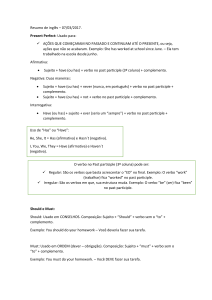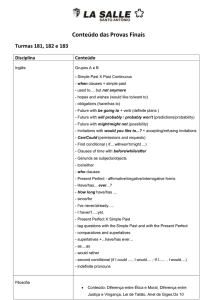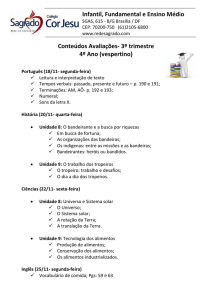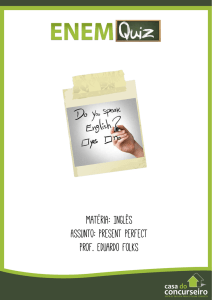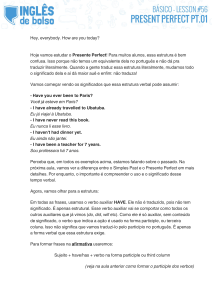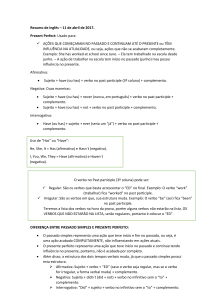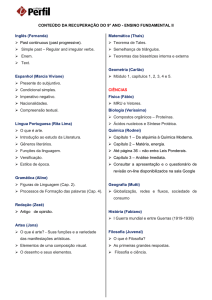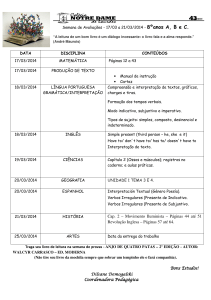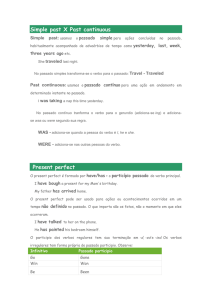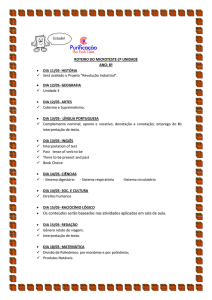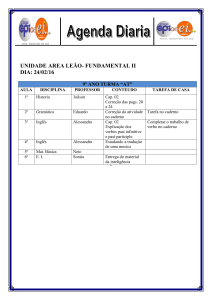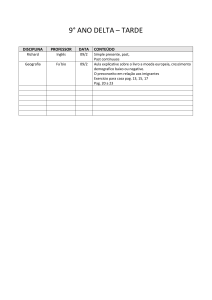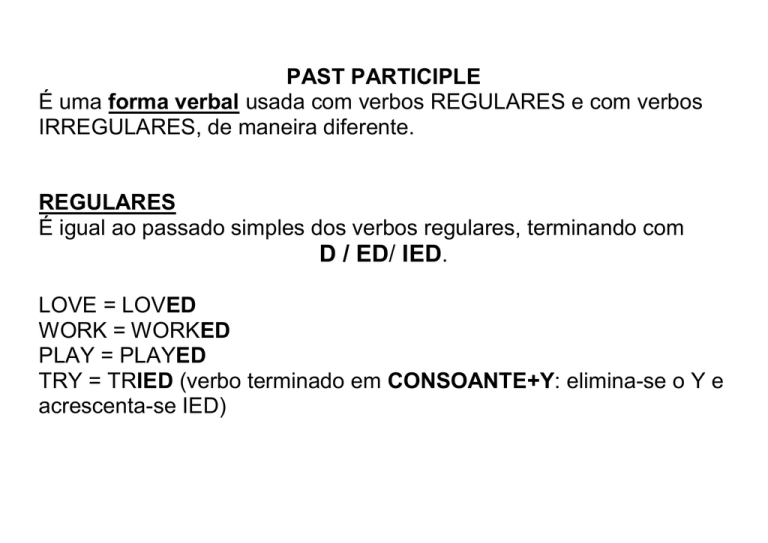
PAST PARTICIPLE
É uma forma verbal usada com verbos REGULARES e com verbos
IRREGULARES, de maneira diferente.
REGULARES
É igual ao passado simples dos verbos regulares, terminando com
D / ED/ IED.
LOVE = LOVED
WORK = WORKED
PLAY = PLAYED
TRY = TRIED (verbo terminado em CONSOANTE+Y: elimina-se o Y e
acrescenta-se IED)
IRREGULARES
Para sabê-los é preciso consultar a TERCEIRA COLUNA a lista de
verbos.
INFINITIVE
PAST
Be
Buy
Make
Was/were
Bought
Made
PAST
PARTICIPLE
Been
Bought
Made
TRANSLATION
Ser/estar
Comprar
Fazer
PRESENT PERFECT (tempo verbal)
É present porque usa o verbo “to have” no presente:
I/you/we/they... have
He/she/it... has
É perfect porque uso outro verbo na forma Past participle.
Logo: é um tempo verbal que usa dois verbos.
They have bought a new car. (bought = verbo “to buy” - IRREGULAR)
She has worked a lot. (worked = verbo “to work” - REGULAR)
QUANDO USAR?
PAST+PRESENT: ação que começou no passado e continua
acontecendo no presente.
Brazil has had problems with dishonest politicians.
Brazilian people have not trusted politicians.
RESULT NOW: ação que começou no passado e produziu um
resultado agora.
The weather has changed dramatically.
EXPERIÊNCIA DE VIDA: situações pelas quais alguém passou desde
que nasceu até o momento em que se está falando.
Have you ever eaten sushi?
I have never eaten sushi.
IN PROGRESS: ação começou no passado e acabou dentro de um
período de tempo que não terminou.
The students have done many exercises this semester.
AFIRMATIVA:
I/You/We/They + Have + past participle
I have worked all day.
He/She/It…+ Has + past paticiple
She has taken vitamins.
NEGATIVA
I/You/We/They + Have not / Haven’t + past participle
I have not worked all day.
He/She/It…+ Has not/ Hasn’t + past paticiple
She has not taken vitamins.
INTERROGATIVA:
Have + I/You/We/They + past participle + ?
Have you worked all day?
Has+ he/she/it…+past participle + ?
Has she taken vitamins?
Expressões de tempo:
EVER / NEVER – são usados para falar sobre experiência de vida.
a) EVER (já) – é usado em frases interrogativas.
Has she ever travelled to Morocco?
Have you ever read “Harry Potter”?
b) NEVER (nunca) – é usado em frases negativas, mas sem usar not,
porque o never já indica negação (never = not + ever).
She has never travelled to Morocco.
You have never read “Harry Potter”.
OBS: You have not ever read “Harry Potter”
JUST (já) – é usado para dizer que algo acabou de acontecer. É
sempre usado entre o HAVE/HAS e o PAST PARTICIPLE:
They have just married.
(HAVE/HAS + just + PAST PARTICIPLE)
ALREADY (já) – é usado para dizer que algo aconteceu antes do
previsto ou esperado. Pode ser usado entre o HAVE/HAS e o PAST
PARTICIPLE ou no final de frase afirmativa.
I’ve already finished my homework.
(HAVE/HAS + already + PAST PARTICIPLE)
He’s finished my homework already.
(HAVE/HAS + PAST PARTICIPLE + already)
YET (já/ainda) – é usado apenas no FINAL DE FRASES
interrogativas ou negativas:
I haven’t started my homework yet.
Have you started your homework yet?
CONTRAÇÕES:
HAVE = ‘VE
HAS = ‘S
HAVE NOT = HAVEN’T
HAS NOT = HASN’T

